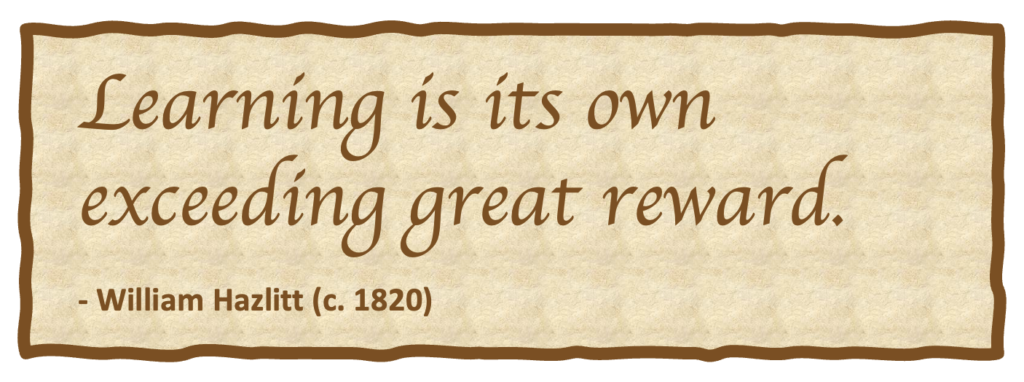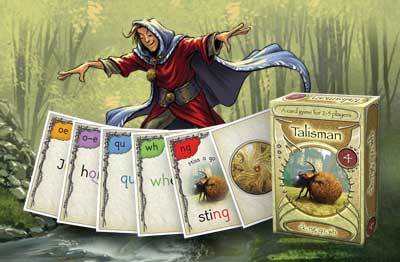“Let’s make learning fun!”
I always do a silent inner eye roll when I hear that phrase. The exclamation is loaded. Loaded with unspoken messages.
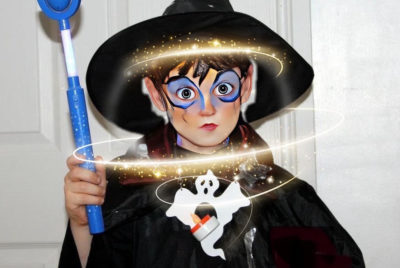
The first message is that whatever we are currently doing with our pupils must be as dull as ditch water and need jazzing up. We are urged to bring ‘magic’ into the classroom! It also suggests that learning is intrinsically ‘not fun’ and is, in fact, hard, unpleasant work. So, here is the second message: there is no reward or pleasure in the learning itself. Most teachers would be devastated if the former was the case in their classroom and would argue vociferously against the latter, saying that, “learning is its own exceeding great reward,” especially if they are English teachers. (William Hazlitt circa 1820
Time is limited
As if those things weren’t bad enough, there is also the issue of time. Time worries me a great deal. The teaching time our pupils have available to them is limited. It is limited by timetabling, limited by curriculum pressures, limited by availability of resources and, in the case of my pupils with SEND, often limited by their individual ability to attend and engage for an extended time. The actual time that pupils spend ‘doin’ learning’ is relatively brief so we, as teachers, need to make sure we are planning for maximum impact. Kaboom! We need to fill this precious optimal learning time with relevant teaching and tasks/activities that enable our pupils to learn what we set out to teach them in a lean and efficient way.
‘Fluff ‘n’ Stuff’ vs direct, explicit teaching
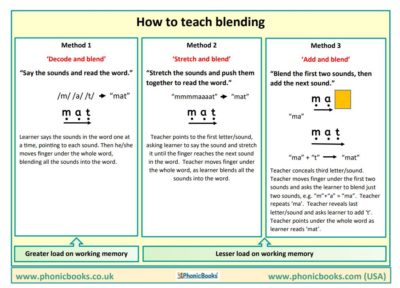
Activities to practice skills and apply new learning should be similarly streamlined and connections between different aspects made explicit. I did my teacher training in the mid-80s (primary and pre- National Curriculum, if you can imagine such a thing). Looking back, I can see that I was basically trained to entertain my pupils whilst attempting to sneak in some learning without them noticing. I spent a lot of time designing Fluff’n’Stuff activities to carry the curriculum ‘incognito’ and ‘facilitate discovery,’ rather than just teaching the curriculum itself.
Inquiry-based learning is appealing because it seems like we are ‘freeing’ children to discover things for themselves, we just set things up for them to explore and come to their own conclusions. Unfortunately, many children come to the wrong conclusions, and many are just confused about the whole process and their part in it. This leads to frustration and dissatisfaction with ‘learning’ generally. Not a good outcome of our teaching.
During my first year as a probationer (yes, that was the term used) I became rapidly disillusioned with F’n’S and its poor outcomes for the children. I jettisoned it in favor of the deeply unfashionable approach of teaching children directly and following a structured, sequential scheme. The expansive time frame of the F’n’S approach means pupils miss out on real time opportunities to learn stuff. We need to teach pupils what they need to learn in a prompt and effective way. And that’s what I have done ever since, applying it to a rigorous approach to teaching reading and spelling.
Structured doesn’t mean boring
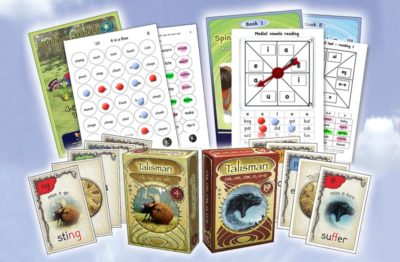
Do my pupils all sit in gloomy silence? Do I find them disengaging in lessons out of sheer boredom? Am I ever tempted to reach for the top hat and cane? Indeed not. They learn lots and we laugh lots! And don’t get me wrong, efficient teaching activities can be hands-on and innovative. Simple games are a great way for pupils to experience repetition to achieve automaticity in reading instruction, for example. From time to time, I see F’n’S sneaking into educational discussions (I’m looking at you, Twitter!), disguised as something new / something natural / something to do with Finland. I am momentarily rocked by flashbacks, but calm is soon restored as a raft of research is cited by those far cleverer than I, such as this great article, in researchED, from Kirschner, Sweller and Clark (2018).
The joy of learning
That William Hazlitt bloke was pretty spot on, in my opinion. We don’t need F’n’S. We ought to give our pupils more credit for appreciating the intrinsic joy of ‘doin’ some good learning.’ They, like us, know that there is nothing more satisfying than noticing ourselves learning and making progress—now that’s magic!
1. Clark, R., Kirschner, P. A., & Sweller, J. (2018). Inquiry learning isn’t – a call for direct explicit instruction. researchED, 2018 (1). https://researched.org.uk/2018/07/06/inquiry-learning-isn’t-a-call-for-direct-explicit-instruction-2
#structuredliteracy #teachreadingandspelling #phonicsinstruction #learntoread
* * *
Ann Sullivan has over 30 years’ experience in mainstream and specialist education. Based in the UK, her career includes roles as a KS1 and KS2 class teacher, SEN literacy teacher, school-based Special Educational Needs Coordinator (SENCO), an advisory teacher for pupils with special educational needs and a Specialist Leader in Education (SLE). She is on the writing team for pdnet (a network for those supporting children with physical disabilities in schools) and is a trustee of Speaking Out Forum (a charity that gives young people with SEND the chance to ‘have a voice’). Ann is now a literacy consultant, trainer and writer and creator of the Phonics for SEN programme.
If you’re looking for simple games to help embed learning,
check out the Talisman Card Games from Phonic Books.


